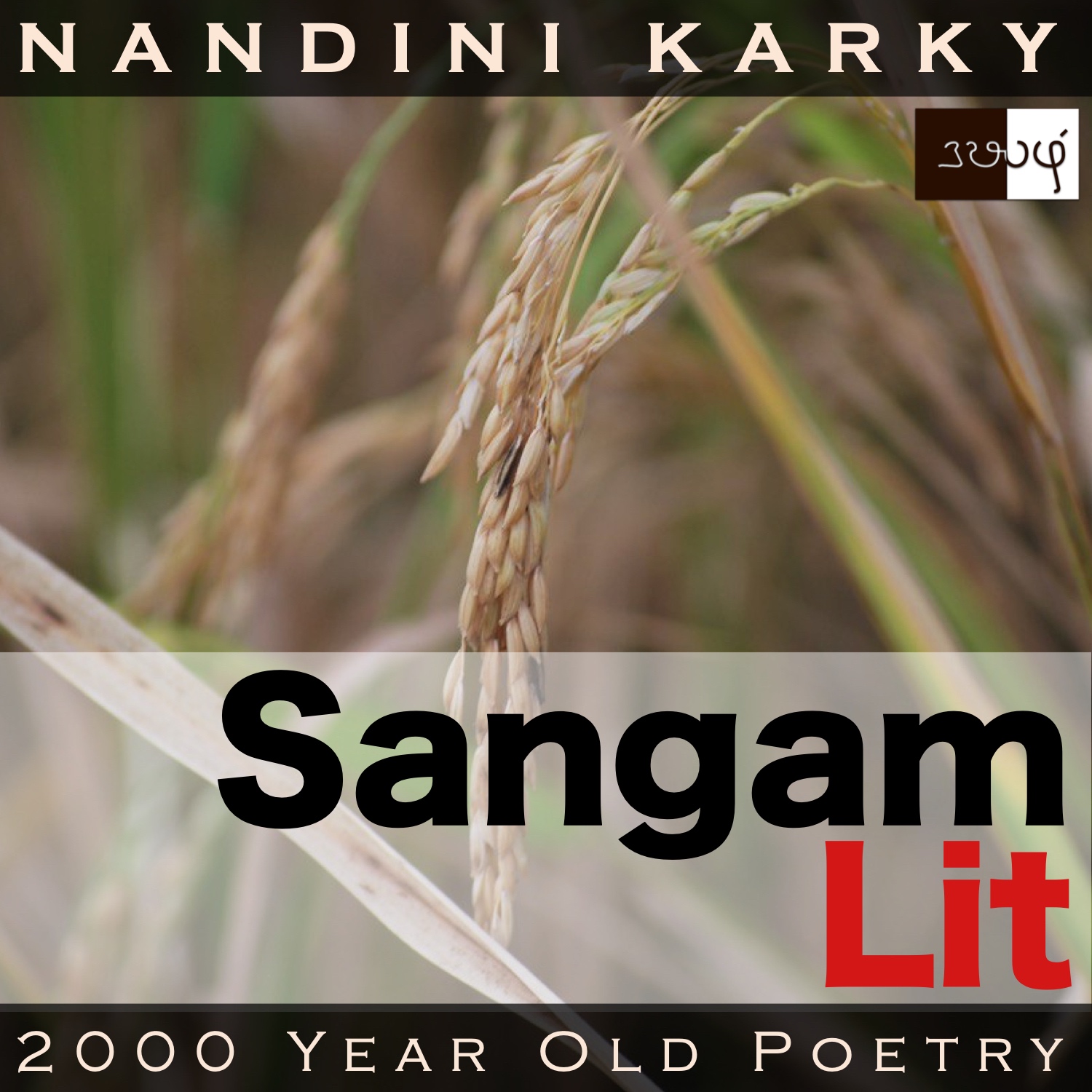Podcast: Play in new window | Download
Subscribe: Apple Podcasts | Spotify | Amazon Music | Android | iHeartRadio | TuneIn | RSS | More

In this episode, we celebrate the happy tidings, as depicted in Sangam Literary work, Natrinai 134, penned by an anonymous poet. Set in the ‘Kurinji’ landscape of mountainous regions, the verse speaks in the voice of the confidante to the lady, laying to dust, the lady’s fears about being unable to meet with her man.
”இனிதின் இனிது தலைப்படும்” என்பது
இதுகொல்?-வாழி, தோழி!-காதலர்
வரு குறி செய்த வரையகச் சிறு தினைச்
செவ் வாய்ப் பாசினம் கடீஇயர், ”கொடிச்சி!
அவ் வாய்த் தட்டையொடு அவணை ஆக!” என,
ஏயள்மன் யாயும்; நுந்தை, ”வாழியர்,
அம் மா மேனி நிரை தொடிக் குறுமகள்!
செல்லாயோ; நின் முள் எயிறு உண்கு” என,
மெல்லிய இனிய கூறலின், யான் அஃது
ஒல்லேன் போல உரையாடுவலே!
As if one’s thrown headlong into a river of honey, the poem opens with the words ‘இனிதின் இனிது’ meaning ‘sweeter than sweetness’! In ‘வரு குறி ‘, we meet the word often discussed in the context, but never in the actual poem, meaning ‘the lovers’ meeting place’. ‘செவ் வாய்ப் பாசினம்’ makes a huge ‘flock of red-mouthed green parrots’ flutter before our eyes. Shortly thereafter, the word ‘தட்டை’, which means ‘flat’ in contemporary language, appears in the meaning of a ‘sling’ here. ‘யாய், நுந்தை’ are the famous ancient Tamil words for ‘mother and father’, which have morphed into ‘தாய், தந்தை’ today. Once again, we glimpse at the glorified ‘dark complexion’ in ‘மா மேனி’ and also ‘முள் எயிறு’ or ‘thorn-like teeth’. The verse ends with ‘உரையாடுவலே’ meaning ‘conversed’. Fascinating to see that this word has lived on as ‘உரையாடல்’ or ‘conversation’ for more than two thousand years. Expert conversationalists, our Tamils, no doubt!
The man and lady have been in a love relationship for a while. As days go by, the lady starts fearing that her parents will notice the changes in her and confine her to the house. Seeing her anxious, her confidante says, “Is this what they call as something sweeter than sweetness? Long may you live, my friend! That place in the mountain slopes, marked by your lover as the trysting spot, is the millet field. Bidding us to go to that millet field and chase away the flock of red-beaked green parrots, mother said, “O mountain lass, please take the sticks and slings, and go there!’ Father too, spoke gentle, sweet words saying, “Long may you live, O dark-complexioned, young girl, wearing bangles many! Won’t you leave to the fields now? I shall give you a kiss on your thorn-like teeth!” But, I spoke to them, pretending as if we were not interested in going thither!” With these words, the confidante assures the lady and establishes that her parents suspect nothing.
Now, for the nuances! The poem reveals the ancient life in those mountain slopes, in detail. The people who lived in these regions seem to have indulged in cultivation of millet crops along the slopes. They have entrusted an important task to their young girls, which is to chase away flocks of parrots that come to feed on the millets. The wild things that feed wherever there’s food are now chased away by humans who have claimed the land for themselves! We see these mountain folk intent on making sure that the parrots don’t raid their food source. Another facet seen here is that the daughter of the house and her confidante are seen as one and the same. Both girls would not move anywhere without the other and so, when the parents say those words to the confidante, it’s to be taken as if those were addressed to their own daughter.
A curious thing I noticed is that the mother is focused on the practical aspects of the task and mentions devices the lady needs to take to the field whereas the father is focused on the emotional aspects of the mission. He calls her with gentle, sweet words and offers her a loving incentive to make her do the task. Interesting reversal of roles, contrary to long-standing beliefs about the nature of men and women! Returning to the poem, we see that in order to remove even an iota of doubt in the parents, the confidante further pretends as if she and the lady have no interest whatsoever in going to the millet fields. A mastermind, she is, undoubtedly! I want to end this reflection by turning your attention to the ecstatic lines in the beginning and ask you to ponder on what is that which is ‘sweeter than sweetness’ in your life.




Share your thoughts...